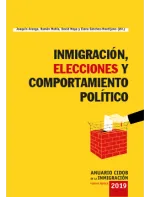Domestic service as a means of accessing administrative regularisation in Spain

The sociodemographic changes experienced over the past 20 years have led to an increase in the demand for carers among families in Spain. These transformations, along with the increase in foreign women willing to work in domestic service, could explain the greater social importance of this labour sector. In this context, the main aim of this paper is to learn whether domestic service is a means of accessing administrative regularisation in the destination country, analysing the differences between female Latin American and African workers in a case study in the Madrid area. The study uses a qualitative methodology that gathers the experiences of 12 Latin American and 10 African women domestic workers and is complemented by interviews with specialists and experts on labour regulations and migrant women’s integration into the workforce.
Authors:
Irene Lebrusán Murillo, Investigadora postdoctoral, Institute for Global Law and Policy (Harvard Law School), RCC-Harvard; Pierina Cáceres Arévalo, Investigadora social, Fundación Santa María La Real del Patrimonio Histórico and Elisa Brey, Profesora asociada, Sección Departamental de Sociología Aplicada, Facultad de Ciencias de la Información, Universidad Complutense de Madrid
Key Words: Spain, female migration, administrative regularisation, domestic service, Latin American women, African women, Madrid
How to cite this article: Lebrusán Murillo, Irene; Cáceres Arévalo, Pierina y Brey, Elisa. «El servicio doméstico como vía de acceso a la regularización administrativa en España». Anuario CIDOB de la Inmigración 2019 (noviembre de 2019), p. 246-272. DOI: doi.org/10.24241/AnuarioCIDOBInmi.2019.246
DOI: doi.org/10.24241/AnuarioCIDOBInmi.2019.246
>> The full text articles of this issue are available only in Spanish language